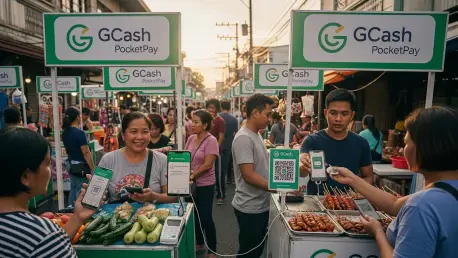Setting the Stage for Digital Transformation in Philippine Commerce
In the dynamic landscape of Philippine commerce, a staggering number of micro, small, and medium enterprises (MSMEs) still grapple with the limitations of cash-based transactions, often missing out on the benefits of digital payments, which could significantly enhance their business operations. This challenge, deeply rooted in a historically cash-heavy economy, underscores the urgent need for accessible and affordable payment solutions. GCash, the nation’s leading digital wallet, has stepped into this gap with an innovative offering—PocketPay—developed in partnership with BPC, a global payments provider. This market analysis delves into how this card-present acceptance solution is poised to reshape merchant payments by leveraging everyday technology, breaking financial barriers, and driving the country toward a cash-lite future. The purpose of this examination is to uncover key trends, data-driven insights, and projections that highlight the transformative potential of this initiative for Filipino businesses.
Unpacking Market Trends and Data in Digital Payments
The Rise of Mobile Wallets and Merchant Needs
The Philippine digital payment market has witnessed significant growth over recent years, driven by widespread smartphone adoption and government-backed financial inclusion initiatives. With over six million active users on the GCash platform alone, the demand for scalable payment acceptance tools among merchants has surged. MSMEs, which form the backbone of the nation’s economy, often lack the resources for traditional point-of-sale systems due to high costs. GCash PocketPay addresses this pain point by transforming NFC-enabled Android devices into payment terminals, eliminating the need for expensive hardware. Market data suggests that this affordability could accelerate digital adoption among small vendors, particularly in urban markets where contactless payments are gaining traction.
Technological Innovations Driving Payment Accessibility
A critical trend shaping the market is the integration of consumer-grade technology into business solutions, as exemplified by PocketPay’s use of BPC’s SmartVista acquiring platform. This modular, cloud-ready architecture enables rapid deployment and seamless updates, ensuring merchants can adapt to evolving payment preferences without significant investment. Currently supporting contactless Visa and Mastercard transactions, the platform is set to incorporate QR-based payments, aligning with the national QRPH standard. Industry analysis indicates that such unified payment ecosystems are likely to capture a larger share of the merchant market by offering versatility, with projections estimating a substantial increase in digital transaction volumes over the next two years from 2025 to 2027.
Regional Challenges and Adoption Barriers
Despite the promising outlook, regional disparities in internet connectivity and smartphone penetration pose notable hurdles to widespread adoption. Rural merchants, in particular, may struggle with inconsistent access to the infrastructure needed to utilize PocketPay effectively. Additionally, technological literacy remains a barrier for smaller vendors unfamiliar with digital tools. Market surveys highlight a persistent misconception that digital payments are complex or insecure, slowing acceptance in certain demographics. Addressing these challenges through targeted education and phased rollouts will be crucial for ensuring that the benefits of this innovation reach all corners of the Philippine market, from bustling city centers to remote provinces.
Future Projections for Merchant Payment Ecosystems
Scaling Digital Inclusion Across Diverse Markets
Looking ahead, the trajectory of GCash PocketPay signals a broader shift toward inclusive financial technologies in emerging economies like the Philippines. Projections suggest that mobile-based payment solutions will play a pivotal role in integrating underserved markets into the digital economy, with MSMEs expected to drive a significant portion of transaction growth. The scalability of platforms like SmartVista positions GCash to expand its merchant base rapidly, potentially doubling acceptance points within a few years. This growth aligns with global trends where accessible payment tools are becoming central to economic empowerment, fostering resilience among small businesses.
Regulatory Support and Market Expansion Opportunities
Another factor influencing future outcomes is the potential for regulatory frameworks to bolster cash-lite initiatives. Government policies promoting digital transactions could accelerate the adoption of solutions like PocketPay, especially if paired with incentives for merchants. Market analysts also foresee opportunities for expanding payment channels, such as integrating cross-border transactions or additional payment methods, to cater to a growing tourist and e-commerce sector. These developments could position the Philippines as a regional leader in fintech innovation, provided that interoperability between local and international systems continues to improve over the coming years.
Adapting to Evolving Consumer Behaviors
Consumer preferences are shifting toward convenience and speed, with contactless and QR payments gaining popularity among younger demographics. This behavioral change presents a fertile ground for PocketPay to capture market share, as merchants equipped with versatile payment options can better meet customer expectations. Forecasts indicate that unified payment platforms will become the norm, reducing fragmentation in the market. However, sustained investment in merchant training and infrastructure support will be essential to ensure that smaller vendors can keep pace with these evolving demands, maintaining competitiveness in an increasingly digital landscape.
Reflecting on Key Insights and Strategic Pathways
Looking back, the analysis of GCash PocketPay reveals a pivotal moment in the evolution of Filipino merchant payments, marked by groundbreaking affordability and technological innovation. The partnership between GCash and BPC tackles critical barriers, from high hardware costs to fragmented payment systems, setting a precedent for inclusive fintech solutions. For merchants, the strategic takeaway is clear: adopting scalable tools like PocketPay offers a pathway to expand customer reach and reduce operational burdens. Stakeholders in the fintech space gain valuable lessons on the importance of interoperability and localized implementation strategies. Moving forward, the focus shifts to actionable steps—merchants are encouraged to leverage available training resources to build digital confidence, while policymakers and industry leaders are urged to prioritize infrastructure development and supportive regulations. This initiative lays a robust foundation, pointing toward a future where digital payments could become the cornerstone of economic participation across the Philippines.









